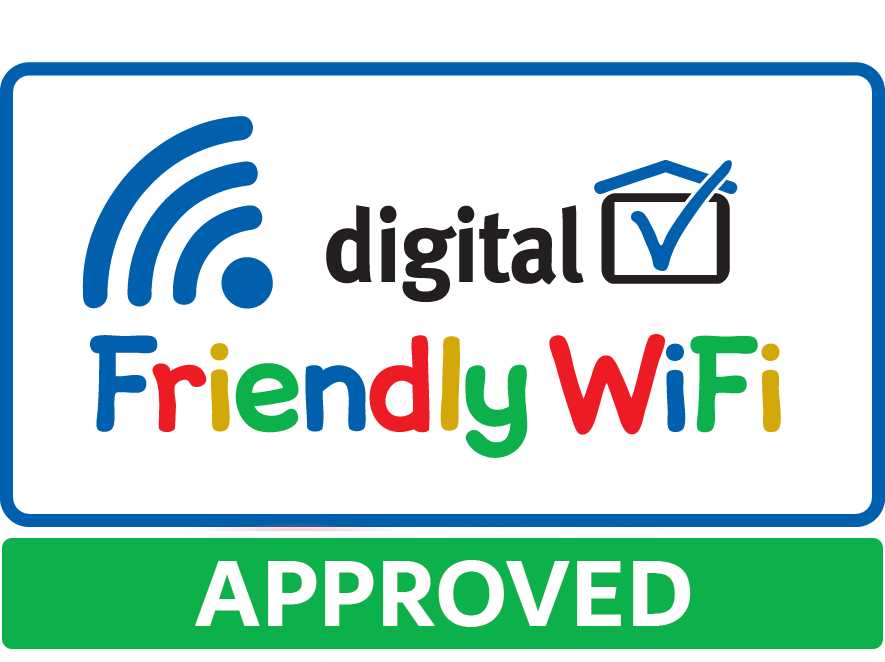Our Curriculum
Our curriculum is broad and balanced - We run a large range of courses and qualification types at KS4 and KS5. Our 3-year KS3 ensures that students build understanding and know more over time. All years have taught sessions for PSHE taught by a committed team. Our curriculum encourages the EBACC core but maintains choice. We give rich opportunities across all the subject areas including the arts, Philosophy (RE), PE and Design and Technology. We have developed pathways through qualifications, students are able to study subjects across KS4 and into KS5.
Substance and deep learning – Our curriculum is planned and sequenced to ensure learners know more and are able to do more over time. We have developed our KS3 schemes of learning towards developing mastery over time. This is assessed through a revised assessment and reporting system.
Developing independent learners - At The Knights Templar School we use training and support for subject teams to help plan and scaffold students thinking to develop the skills of independent learning. We offer a curriculum that supports the development of the whole child through learning in subjects, personal development and developing students ‘approach to learning’ (ATL).
The school has worked hard to develop the curriculum intent, implementation and impact across all subject areas. This has been through CPD training and development, middle leader line management, coaching and development. Staff support students with the carefully planned and sequenced curriculum to ensure students know and can do more over time.
Curriculum objectives from the school improvement plan (SIP)
To ensure students achieve their best through academic and vocational excellence:
- Providing a broad a curriculum that is ambitious for all students and supports their next steps
- Delivering consistently good teaching and learning, to ensure progress over time.
- Identifying, recognising and adapting for a variety of students’ individual needs, closing gaps in outcomes.
- Promoting confident and effective communication and literacy.
Curriculum time in each subject for Year 7-11
The tables below show how many hours a student will spend in each subject over a fortnight.
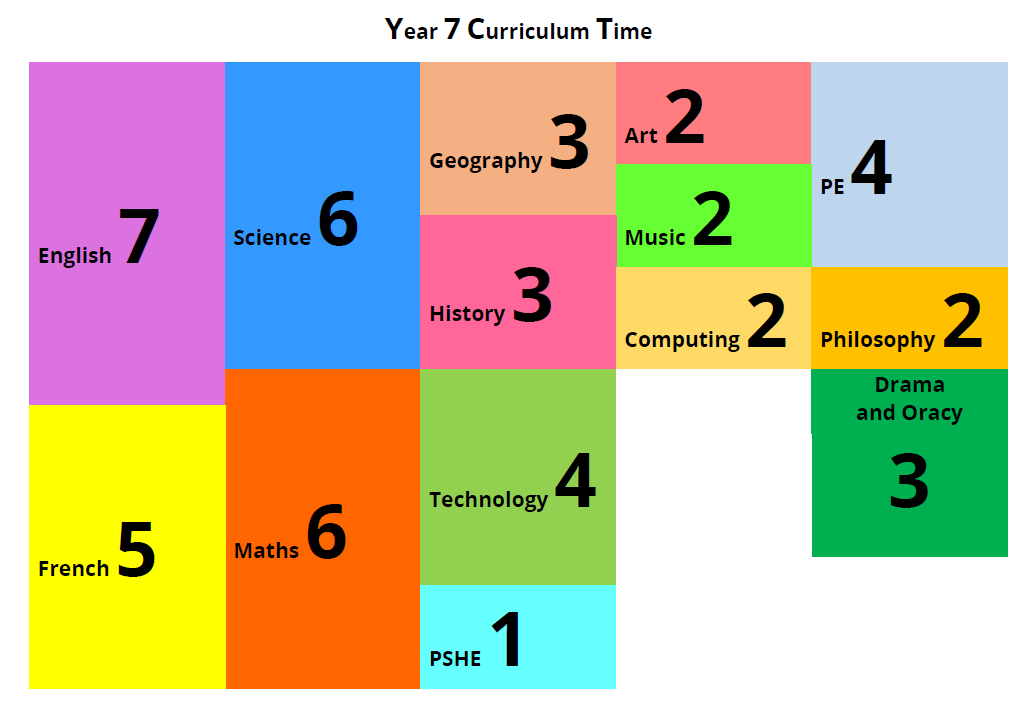
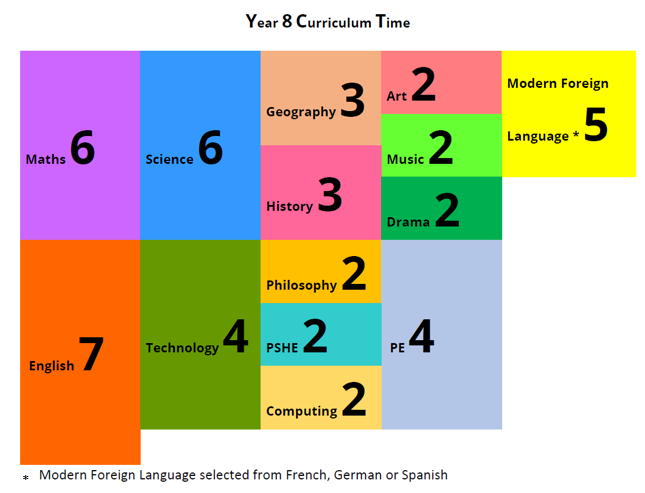
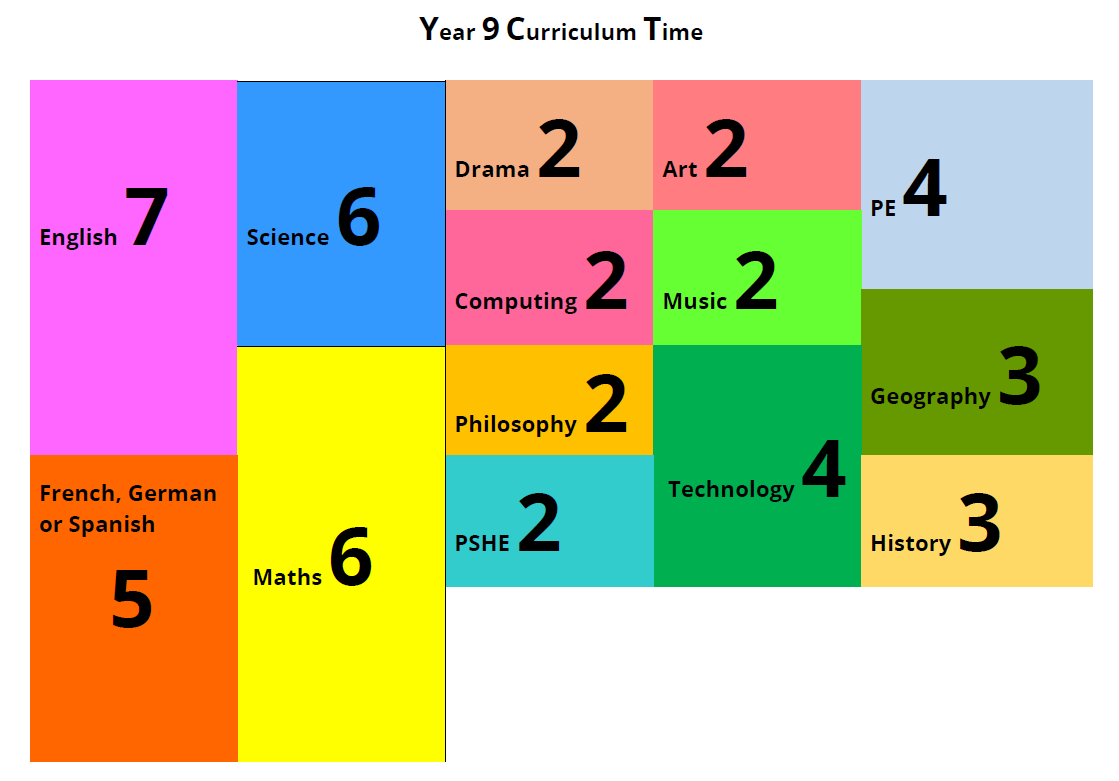
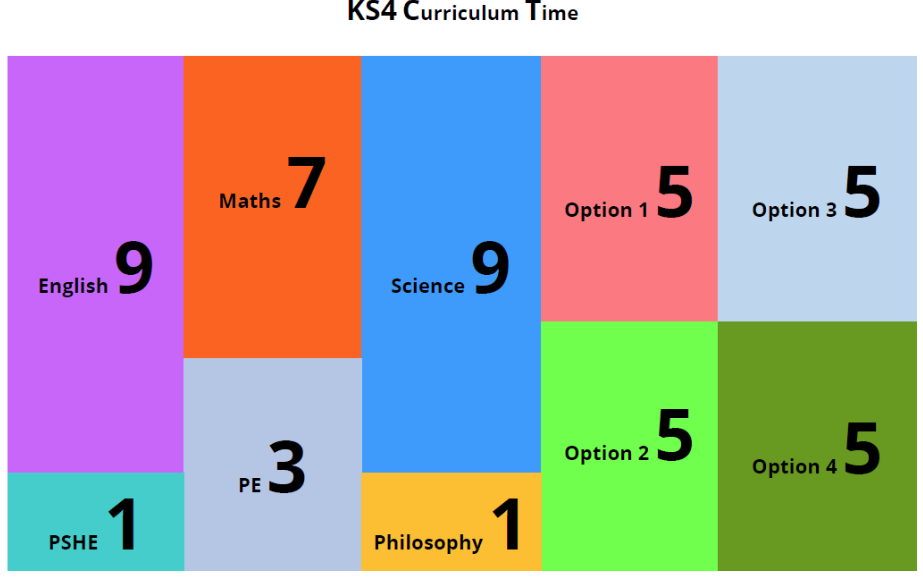
Find out more
Please click on the year groups below to find out more about the curriculum for students in that year group.
Year 7
Year 7 students study a broad and balanced curriculum that lays the foundation for their time at secondary school, building on and developing knowledge and skills acquired at primary school and introducing new subjects and skills that will be necessary for secondary school life.
Year 7 students study the subjects shown in the table below. You can find more specific information about what students learn in each subject, by clicking on the subject name.
|
Subject |
Number of lessons per fortnight |
|
2 |
|
|
Arts and Adventure Based Learning |
2 |
|
2 |
|
|
2 |
|
|
6 |
|
|
5 |
|
|
3 |
|
|
3 |
|
|
6 |
|
|
2 |
|
|
4 |
|
|
2 |
|
|
1 |
|
|
6 |
|
|
4 |
Year 8
In Year 8, students are taught in sets for Maths. It is important that students are in the most appropriate set for their academic needs and we decide which set best suits each student after careful consideration using a range of information, including student performance throughout Year 7 and assessments. We review our students’ sets periodically and occasionally adjust sets should progress be faster or slower than anticipated. We include some parallel sets, which means that both classes are made up of students of similar academic ability and cover the same or similar material. There are 8 sets: 1, 2a, 2b, 4, 5a, 5b,7 and 8. Parallel sets are 2a and 2b.
For their languages – students select from either French, German, Spanish or Fast-Track [French and German]. This selection is based on their experience of these languages in Year 7.
In English, students are taught in mixed-ability groups, meaning that all students can access the full curriculum throughout the year.
Year 8 students study the subjects shown in the table below. You can find more specific information about what students learn in each subject, by clicking on the subject name.
|
Subject |
Number of lessons per fortnight |
| 2 | |
| 1 | |
| 2 | |
| 6 | |
| 4 | |
| 4 | |
| 3 | |
| 3 | |
| 6 | |
| 2 | |
| 1 | |
| 4 | |
| 2 | |
| 6 | |
| 4 |
Year 9
Year 9 students continue to study a broad and balanced curriculum that continues to build on and develop knowledge and skills acquired at primary school and during Years 7 and 8. This learning completes the foundation for successful GCSE study in Years 10 and 11.
In Year 9 students will choose to study either French or German, some students may be given the option to study Spanish. Students will also choose to study two subjects from Art, Music or Drama. Some students will complete the Arts Award, and study financial studies and IT skills, rather than studying a modern foreign language.
Year 9 students study the subjects shown in the table below. You can find more specific information about what students learn in each subject, by clicking on the subject name.
|
Subject |
Number of lessons per fortnight |
| 6 (3 for each subject chosen) | |
| Computing | 2 |
| English | 6 |
| French, German, Spanish | 5 |
| Geography | 3 |
| History | 3 |
| Mathematics | 6 |
| Personal, Social and Health Education | 2 |
| Physical Education | 4 |
| Philosophy, Religion and Ethics | 2 |
| Science | 6 |
| Technology | 4 |
Years 10 and 11
Core Curriculum
The Core Curriculum constitutes the elements of the school curriculum that all students must study. These subjects are not optional. Examined subjects will lead to one or more GCSE qualifications, while the non-examined subjects will not lead to a qualification, but form an important part of our students’ personal development.
The subjects that form the core curriculum are shown in the table below. You can find more specific information about what students learn in each subject, by clicking on the subject name.
|
Subject |
Examined |
Qualifications |
Number of lessons per fortnight |
|
|
GCSE English Language GCSE English Literature |
9 |
|
|
|
GCSE Mathematics |
7 |
|
|
GCSE Combined Science (worth 2 GCSEs) |
9 |
||
|
Core Philosophy, Religion and Ethics
|
1 |
||
|
3 |
|||
| Personal, Social and Health Education with Careers |
1 |
Guided Options Curriculum
As well as the Core Curriculum of English, Maths and Science GCSEs, students will need to select other courses based on their personal preferences and our guidance. These are known as the guided options.
Our guided options are offered through a pathway structure. Students will receive an individual letter with the pathway considered most appropriate for them along with the groups of courses available on that pathway. We will distribute this letter in early January. A student’s pathways will be either ‘Humanity with Language’ or ‘Open’.
Humanity with Language Pathway
Core curriculum: As above plus either GCSE French, GCSE German or GCSE Spanish (whichever language has been studied in Year 9)
One humanities subject: GCSE Geography or GCSE History
Options subjects: Students may select two options from the table below. So that all students follow a broad and balanced curriculum, students are advised to study no more than two subjects in any group.
|
Creative |
Design and Technology |
Health and Sport |
Humanities and Business |
Sciences |
Additional Languages |
|
GCSE Art or
GCSE Drama or BTEC Tech Award Performing Arts (Acting)
GCSE Music or |
GCSE Food Preparation and Nutrition
|
Cambridge National in Health and Social Care
GCSE Physical Education or Cambridge National in Sport Science
|
|
or Cambridge National in Game Development
|
|
Open Pathway
Core curriculum: As above
One subject from the following: GCSE Computer Science, GCSE French, GCSE German, GCSE Geography or GCSE History
Options subjects: Students may select three options from the table below. So that all students follow a broad and balanced curriculum, students are advised to study no more than two subjects in any group.
|
Creative |
Design and Technology |
Health and Sport |
Humanities and Business |
Sciences |
Life Skills |
|
GCSE Art or
GCSE Drama or BTEC Tech Award Performing Arts (Acting)
GCSE Music or |
GCSE Food Preparation and Nutrition
|
Cambridge National in Health and Social Care
GCSE Physical Education or
|
|
or Cambridge National in Game Development
|
For discussion with the student's Year Leader |
Subject Leaders contact details
|
Subject |
Teacher |
|
|
Art |
Miss J Moyes |
|
|
Art Photography |
Miss J Moyes |
|
|
Biology |
Mr S Quinn |
|
|
Business |
Mr A Catlin |
|
|
Business Cambridge Technical Diploma |
Mr A Catlin |
|
|
Careers |
Mrs A Everington |
|
|
Chemistry |
Mrs J Wallace |
|
|
Computer Science |
Mr J Pieterse |
|
|
D&T |
Mrs C Ellis |
|
|
Dance |
Mrs S Gamester |
|
|
Digital Music Production BTEC |
Mr W Byers |
|
|
Drama & Theatre |
Mrs J Spurling |
|
|
Economics |
Ms A Lawther |
|
|
Engineering |
Mrs C Ellis |
|
|
English |
Mrs K Weston Mrs L Bannister |
|
|
EPQ |
Ms E Thompson |
|
|
Fashion & Textiles |
Miss C Molinari |
|
|
Film Studies |
Mrs R Pedder |
|
|
Food |
Miss C Molinari |
|
|
French |
Mrs N Carlyle |
|
|
Further Maths |
Miss N Low |
|
|
Game Development |
Mr J Pieterse |
|
|
Geography |
Mrs I Flockton |
|
|
German |
Mrs M Johnston |
|
|
Health & Social Care |
Miss K Pearce |
|
|
History |
Mrs C Robertson |
|
|
IT Cambridge Technical Introductory Diploma |
Mr J Pieterse |
|
|
LAMDA Public Speaking |
Mrs J Spurling |
|
|
Law |
Mrs L Wells |
|
|
Maths |
Mr A Buck |
|
|
Maths - Years 7 & 8 |
Mr H Smith |
|
|
Maths - Years 9 & 10 |
Mr J Foley |
|
|
Maths - Year 11 |
Mr P Kempster |
|
|
Media Studies |
Mrs R Pedder |
|
|
Music |
Mr W Byers |
|
|
Music Performance |
Mr W Byers |
|
|
Music Production |
Mr W Byers |
|
|
PE |
Mr M Bradley |
|
|
Performing Arts (Acting) |
Mrs J Spurling |
|
|
Philosophy, Religion and Ethics |
Mrs L Wells |
|
|
Physics |
Mr J Roche |
|
|
Politics |
Ms E Thompson |
|
|
Practical Learning Opportunity |
Miss C Molinari |
|
|
Product Design |
Mrs C Ellis |
|
|
PSHE |
Miss E De Fraine |
|
|
Psychology |
Mrs J Draper |
|
|
Science |
Mr J Grove |
|
|
Sociology |
Mrs K Bradley |
|
|
Spanish |
Mrs K Sansom |
|
|
Sport Cambridge Technical Diploma |
Mr M Bradley |
|
|
Statistics |
Miss N Low |

